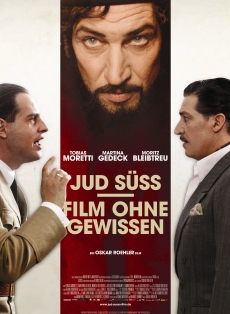 Print
Print
Directed by
Oskar Roehler (The Elementary Particles, No Place to Go)
Starring
Justus von Dohnanyi (The Downfall, The Experiment)
Martina Gedeck (twice nominated at the European Film Awards - The Baader Meinhof Complex, The Good Shepherd, The Lives of Others, The Elementary Particles, Mostly Martha)
Moritz Bleibtreu (The Baader Meinhof Complex, Female Agents, The Elementary Particles - Best Actor at the Berlin Film Festival 2006, Munich)
Tobias Moretti
Production
Franz Novotny - Novotny & Novotny Filmproduktion - and Markus Zimmer (Rosenstrasse) - Clasart Film und Fernsehproduktion
2009 / Original language: German / Color / 1.85 / SR-SRD / available in hd
Berlin, 1939. Ferdinand Marian is an actor, one of the best of his generation. Marian is married to a beautiful Jewish woman whom he deeply loves. One day, he’s offered the starring role in the new Nazi party’s anti-Semitic production, a film based on the novel Jud Süss. The part would make him a star. Marian turns it down but finally gives in to Propaganda Minister Joseph Goebbels’ unrelenting pressure and even worse, his charm. The actor unwittingly plays into the Nazis’ plans and his attempt to give the film’s Jewish protagonist a human touch makes the film the most successful propaganda film ever made…
A heart–wrenching story about the seductiveness - and price - of evil.
 Print
Print
"JEW SUSS – RISE & FALL is both a human drama and a political film that sheds light on the mechanisms of power, political manipulation and its horrific consequences.
The film is the story of how leading man Ferdinand Marian is manipulated by Joseph Goebbels, whose film JUD SÜSS was to become his centerpiece in his propaganda film campaign against the Jews. Marian, both ambitious and naive, allows himself to become involved with things that are way out of his league and will eventually destroy his life. Far too late does he realize that he is trapped in a vehicle of the holocaust and that it has his face on it. Millions of Germans paid to see the movie, over 20 million people altogether in Europe. After its release, Marian himself became an eyewitness of the genocide – and was driven to despair by his feelings of complicity and guilt...
So his dramatic fate is a rise and fall – of a human being as well as a system. A human being who, as with the inevitability of a Greek tragedy, is unable to escape the murderous system he has become part of. The film also provides a look at cultural life in the Third Reich and its most important political component, the movie industry. The Nazis used propaganda movies to rule the country and were masters at it. Goebbels, one of the main characters of our film, was seductive as well as insidious -and extremely charming, otherwise, he never would have been as successful. And he was obsessed. It would have taken superhuman powers to escape carrying out his will. In this sense, the film is also about the eroticism of power.
There have been no major movies about political power, conscience, artists and the movie business in the Third Reich since the very successful MEPHISTO, made over 30 years ago."
"Since the mid-Sixties, producer (and occasional director) Franz Novotny has been interested in Austrian fascism and Nazism. For fourteen years, the production company Novotny & Novotny that he and his wife Karin run, has produced Austrian and international theatrical films, documentaries and commercials.
It was not until 2005, however, that he came across a project that coincided so ideally with his own ideas. At a meeting of producers in Switzerland, he met the agent of screenwriter Klaus Richter (COMEDIAN HARMONISTS) who told him about an exciting project of her client’s: the story of Jud Süß actor Ferdinand Marian. Novotny acquired an option and organized grants to develop the screenplay.
Richter made use of extensive research material such as Friedrich Knilli’s Marian biography “Ich war Jud Süß“, biographies of Veit Harlan, the court records of the proceedings against Harlan in the late forties and early fifties and the diaries of Joseph Goebbels. The first draft stuck very close to historical events. Novotny approached several directors and it soon became clear to him who his favorite was – Oskar Roehler. Novotny thought very highly of his “crystal clear and uncompromising analysis of German life” in films such as ELEMENTARTEILCHEN (Elementary Particles) and ANGST.
Roehler and Richter then collaborated on the script. They remained true to the historical events, especially concerning the making of propaganda film JUD SÜSS, but they also strengthened the emotional conflicts. Several characters became composites, for example Marian was married twice in real life. To intensify the tragic events, they added fictional elements like Britta or the Jewish ancestry of Marian’s wife. Other plotlines, on the other hand, were simplified. The originally planned sequences from his childhood were omitted.
Novotny met with “considerable respect and approval” in the Austrian film industry. “Since the Waldheim affair there has been quite a change in the Austrian mentality, that is, Austrians have stopped thinking of themselves as the first victims but that they were also offenders.” Consequently, all Austrian film subsidies supported the project: the Austrian Film Institute, the Vienna Film Fund, the Department of Cultural Affairs of Lower Austria and the ORF. Novotny soon found a partner in the Tele München subsidiary, Clasart Film. What tipped the scales for Clasart producer Markus Zimmer was not just the explosive nature of the story and its relevance today was the participation of Oskar Roehler. “I admire him a lot for his originality and an intuition that many of his contemporaries lack. The touch of madness that runs through his films is just right for this story. Otherwise, you’d be scared to death of doing something wrong.“
In Germany, the financial burden was shared as well. Funding came from the Filmstiftung Nordrhein-Westfalen, the FilmFernsehfonds Bayern, the German Federal Film Board and the Deutsche Filmförderfonds as well as the Tele München Group, whose distributing branch, Concorde Film, will release the film theatrically in Germany.
The two producers were able to come up with not just an exciting project and an internationally acclaimed director but a very attractive cast as well. Novotny had already been able to attract Tobias Moretti, one of Austria’s greatest stars for the role of Vienna-born Ferdinand Marian. Moretti is well-known throughout Austria and Germany for his many excellent film and television roles as well as his stage acting. He reacted to Novotny’s offer with both “empathy and enthusiasm”. Novotny: “It’s the role of a lifetime.” Producer Markus Zimmer: “Tobias Moretti is an excellent actor and has the same kind of charisma that Marian had at the height of his career”.
Martina Gedeck, one of Germany’s most respected actresses, took on the role of Anna. Gedeck recently played Ulrike Meinhof in the internationally successful DER BAADER MEINHOF KOMPLEX (Baader Meinhof Complex). She and Oskar Roehler had already worked together on ELEMENTARTEILCHEN (Elementary Particles).
Moritz Bleibtreu has also worked with Oskar Roehler before (AGNES UND SEINE BRÜDER – Agnes and his brothers, ELEMENTARTEILCHEN). Casting him as Joseph Goebbels is a stroke of genius. Markus Zimmer: “It’s absolutely fascinating to see how he interprets the role. Goebbels acts like the boss of a Hollywood studio”.
The casting process came up with even more surprises. Fritz Hippler, the head of the Third Reich’s film corporation, is played by Ralf Bauer, who used to be the surfer star of the popular TV series GEGEN DEN WIND (Against the Wind) and who is now a versatile character actor (i.e. in Roehler’s ANGST). Zimmer: “These are exciting and courageous decisions that are made all too infrequently in German cinema.
The rest of the cast is also made up of first-rate German and Austrian actors, among them Justus von Dohnányi (BUDDENBROOKS) as Veit Harlan, Armin Rohde (RABITT WITHOUT EARS), who played Emil Jannings in MARLENE, as Heinrich George, Heribert Sasse (FALCO - VERDAMMT, WIR LEBEN NOCH !: - Falco: Damn it, we’re still alive !) as Jewish actor Adolf Deutscher, Milan Peschel (FREE RAINER) as Werner Krauss and Rolf Zacher (ENDSTATION FREIHEIT) as Erich Engel. And then there’s the new generation of actors such as Paula Kalenberg (DIE WOLKE, VISION – Aus dem Leben der Hildegard von Bingen) as Kristina Söderbaum, Anna Unterberger (MEIN KAMPF) as Britta. Robert Stadlober (KRABAT) plays her storm trooper boyfriend Lutz.
Shooting was scheduled for 39 days and took the crew to locations in Germany and Austria. The scenes in the Marian house were shot in MMC-Studios in Cologne. The movie scenes in the original JUD SĂśSS were re-enacted in the Bavaria Studios in Munich and then combined with those of Veit Harlan. The rest of the film was shot on locations in Vienna and Lower Austria.
Still, according to Markus Zimmer, JEW SUSS – RISE AND FALL is not “your typical costume piece”.
“This is not going to be the big Nazi film revue, even if we do have to work with the look of the Ufa studios. We’re concentrating on the characters” Franz Novotny adds: “We’re not just going after an exact reproduction of the era but the look and imagery that’s emotionally right.” The Austrian producer is more interested in “truthfulness and strong, moving scenes than production design orgies“.
In fall of 2010, moviegoers in Germany and Austria will be able to see for themselves. For Franz Novotny, a 40 year old dream may be coming true but JEW SUSS - RISE AND FALL is not the end: “For me, coming to terms with Nazism is a process that will never stop.”
 Print
Print













